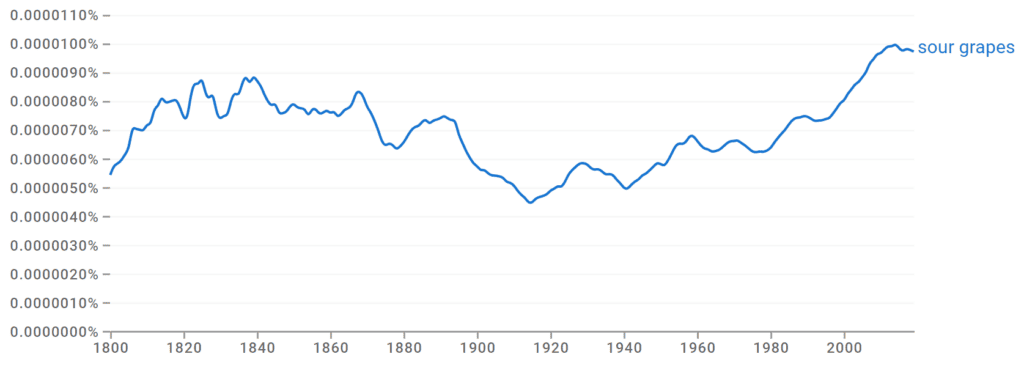Sometimes, the fruit of understanding idioms is ripe and sweet, but today’s idiom is sour grapes, and it’s a bit more…sour. Don’t worry, I’m not here to leave a bitter taste in your mouth. On the contrary, by the end of this article, you’ll know how to use this phrase in a way that’s anything but unpalatable. The play on words is free of charge!
Meaning of Sour Grapes

When someone exhibits sour grapes, they dismiss or mock something just because they can’t have it. Basically, the way kids behave, like, all the time.
It’s supposed to be a form of denial or bitterness that comes out when people don’t get what they want. Rather than admitting their disappointment, they trivialize the value or importance of the coveted thing.
Have you ever told someone they couldn’t have something or you couldn’t do something for them, and their response was, “Fine, I didn’t like it anyway.” That’s sour grapes at its finest.
Origin of the Phrase Sour Grapes

It’s interesting how the past can trickle down into our everyday language, and the phrase sour grapes is a case in point. It comes from one of Aesop’s fables, The Fox and the Grapes.
The story is about a fox who sees some high-hanging grapes and wants to eat them. When the fox can’t reach the grapes, it sulks off, muttering that the grapes were probably sour anyway.
From this, we derive our modern-day idiom. In its original context, the fox embodies the saying, “He who has not tasted grapes says sour.” It’s a cautionary tale about rationalizing our failures and disappointments rather than facing them honestly.
Synonyms for Sour Grapes
Do you need a more serious term in place of sour grapes? Try any of these suitable synonyms.
- Bitterness
- Resentment
- Denial
- Envy
- Jealousy
Sour Grapes Examples in a Sentence

- When Jane didn’t get the job, she said it was probably too demanding anyway, a classic case of sour grapes.
- Dane said he didn’t care that we never invited him to the party, but his dismissal felt like sour grapes to me.
- It’s easy to say that the award doesn’t matter after losing. Such sour grapes don’t fool anyone.
- I think my mother’s criticism of the new restaurant is just sour grapes because she couldn’t get a reservation.
- Don’t give me sour grapes. You know you can’t have a snack before dinner.
- Is he really showing sour grapes over the fact that my ice cream was bigger than his?
- Yesterday, you loved my cookies, but today you claim they suck after I said you couldn’t have one. Geez, sour grapes, much?
Are You Sweet or Sour?
The phrase sour grapes is more than just a statement about fruit. It’s a metaphor for our human tendencies to rationalize disappointments and mask envy. I hope my breakdown of the expression helped you understand how to use it.
Enjoyed reading about this idiom? Check out some others we covered:
